Pride Month 2025 – Best ideas and resources for schools
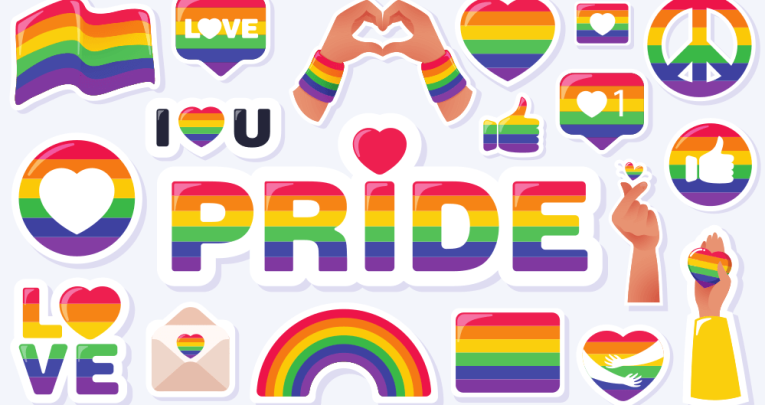
Educate pupils and celebrate LGBTQ+ pride this June with these activities, ideas and other resources…

- by Teachwire
- Classroom expertise and free resources for teachers
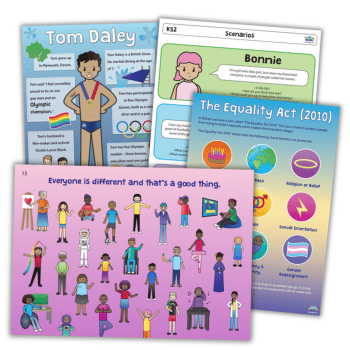
Find everything you need to celebrate Pride Month 2025 with our expert pick of resources, advice and ideas from the chalkface…
Table of contents
What is Pride Month?
Pride Month is all about celebrating LGBTQ+ culture as well as looking back on the struggles and rights violations that LGBTQ+ people have faced, and still face today.
It’s a vital topic, with only 58% of LGBTQ+ pupils reporting that they feel safe at school on a daily basis, compared to 73% of non-LGBTQ+ students (Stonewall’s 2022 School Report).
When is Pride Month UK?
Pride Month 2025 takes place in June, both in the UK and all around the world. June was chosen as this was the month when the Stonewall uprising took place in 1969.
Primary resources for Pride Month 2025
KS2 resources
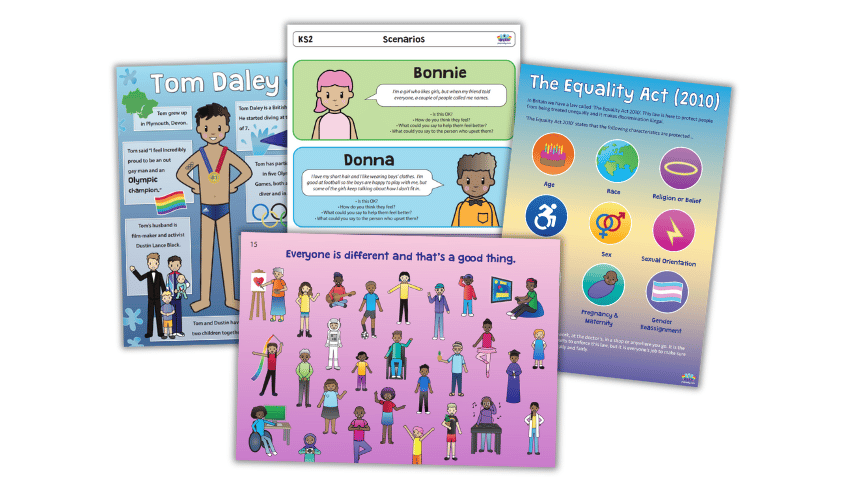
Teach about equality and diversity and combat LGBT+ prejudice before it can begin to form with these free resources from Pop’n’Olly. There’s an assembly about identity, two posters and a set of KS2 scenarios discussion cards.
LGBT scientist activity pack
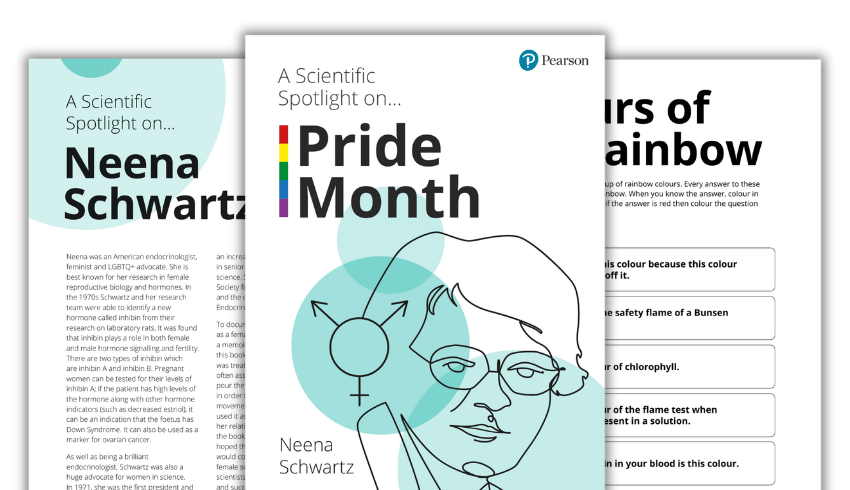
Pride Month is a great time to introduce pupils to the achievements of famous LGBT scientists. Use this free activity booklet to explore key facts about Neena Schwartz – endocrinologist, feminist and LGBTQ+ advocate.
Create an LGBT-inclusive primary curriculum with Stonewall
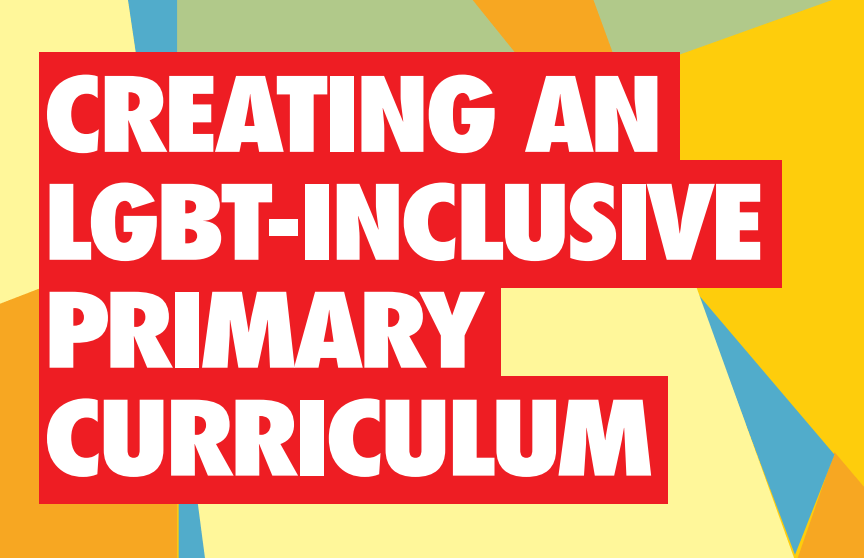
If you’re looking to create an LGBT-inclusive primary curriculum, Pride Month 2025 is a great time to start. This free Stonewall guide can help.
There are also some excellent additional free-to-download PDFs available, such as this guide to working with parents, this framing inclusion through rights resource or this resource for schools with faith values.
Proud to be Me! KS1/2 assembly and lesson ideas pack
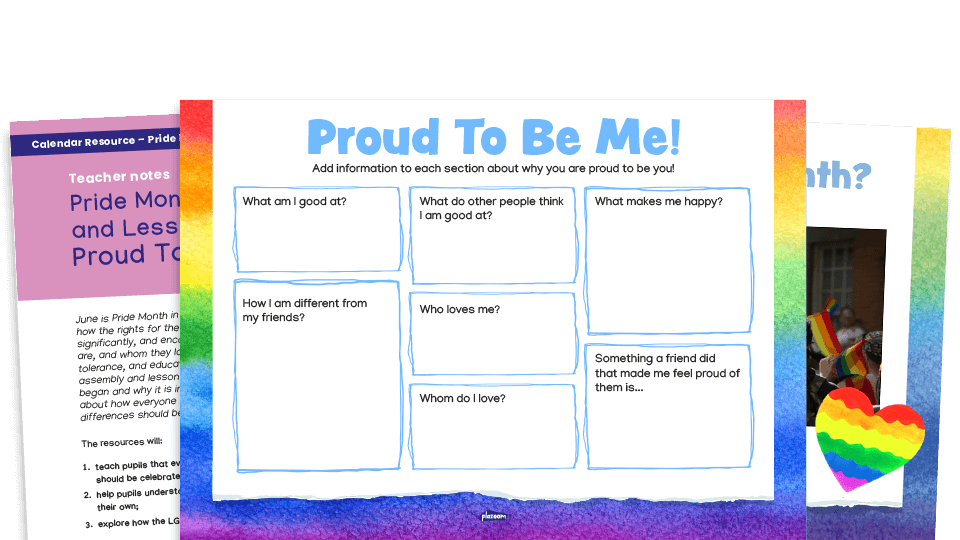
Are your pupils proud of who they are? Use this assembly resource from Plazoom to explain what Pride Month is. Children will learn about celebrating love and accepting that everyone is different.
Explore how pupils in your classroom are different and celebrate these differences. You can also give pupils the opportunity to think about what makes them proud of themselves.
Resources from The Proud Trust
When talking to young LGBTQ+ people, The Proud Trust found that, often, at no point during their growing up were LGBTQ+ people ever visible or discussed.
This then meant that they lacked the language and terminology to help them understand and describe who they are. So if you don’t want the same for any children in your school, give these helpful resources a look.
Happily Ever After is a twist on a traditional fairy tale. It enables you to explore same-gender relationships and equal marriage for KS2 pupils. The digital download contains everything you need to positively teach about same-gender relationships and equal marriage with your class.
Alien Nation is a fun exploration of gender, gender expression, gender roles, and an explanation of different gender identities. The five-lesson pack for KS2 contains everything you need to positively teach about trans, non-binary and cis lives.
Use them during Pride Month 2025, or any time, to cover these important topics in your classroom.
Families – LGBTQ+ Pride Month KS2 discussion and writing pack
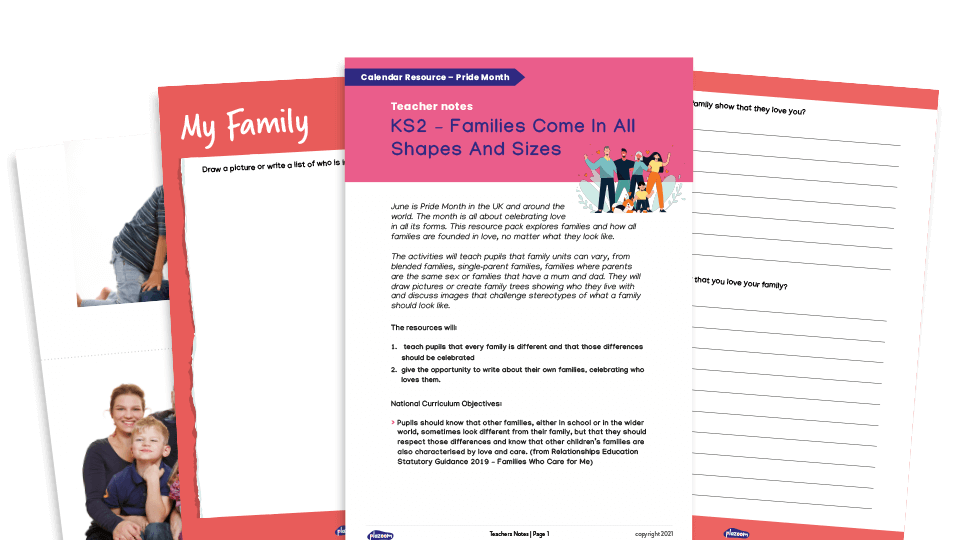
This KS2 resource pack from Plazoom explores families and how all families are founded in love, no matter what they look like.
The activities will teach pupils that family units can vary. It covers blended families, single-parent families, families where parents are the same sex or families that have a mum and dad.
Children will draw pictures or create family trees showing who they live with. Then you can discuss images that challenge stereotypes of what a family should look like.
Nicola Adams KS1 resources pack
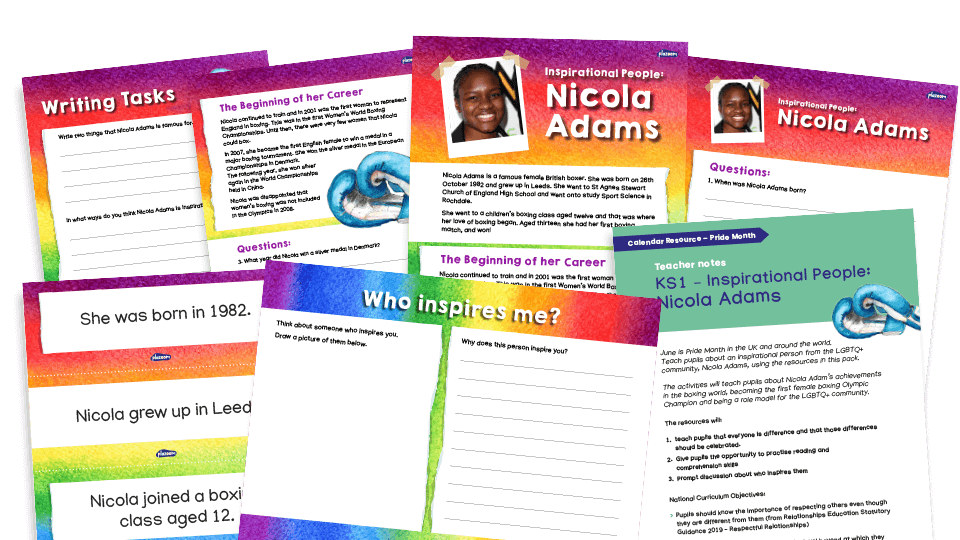
Use Pride Month 2025 to introduce KS1 pupils to sportswoman Nicola Adams. This resources pack from Plazoom looks at her achievements and how she is an inspirational person within and beyond the LBGTQ+ community.
Pupils will have the opportunity to develop comprehension skills using the questions linked to the biographical text. They will also consider how she has inspired others.
They will go on to discuss who inspires them, with opportunities to write about who is inspirational in their own lives.
Premier League Primary Stars resources
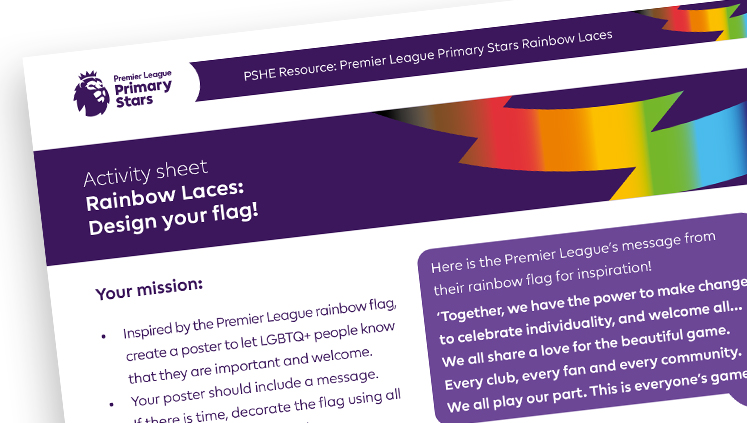
These free, curriculum-linked resources from Premier League Primary Stars offer a great opportunity to explore themes such as inclusivity, allyship, and identity.
Resources include a creative writing activity that builds empathy, an interactive lesson on respect and allyship, real stories from young people to prompt thoughtful discussions and a fun ‘Design Your Own Pride Flag’ task.
More Than Flags & Rainbows
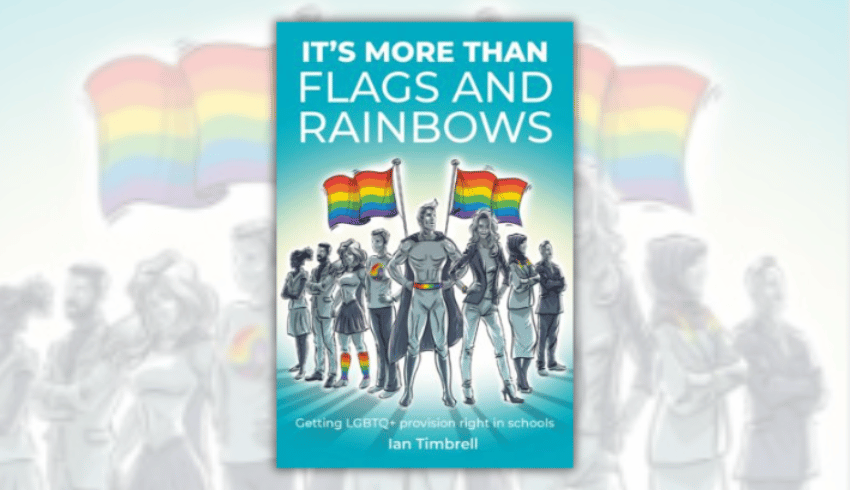
It’s More than Flags and Rainbows: Getting LGBTQ+ provision right in schools by Ian Timbrell provides you with step-by-step guidance for creating an inclusive school where every child feels seen and supported. Take your diversity celebrations further than token gestures or one-off assemblies with these ideas.
Marley’s Pride picturebook
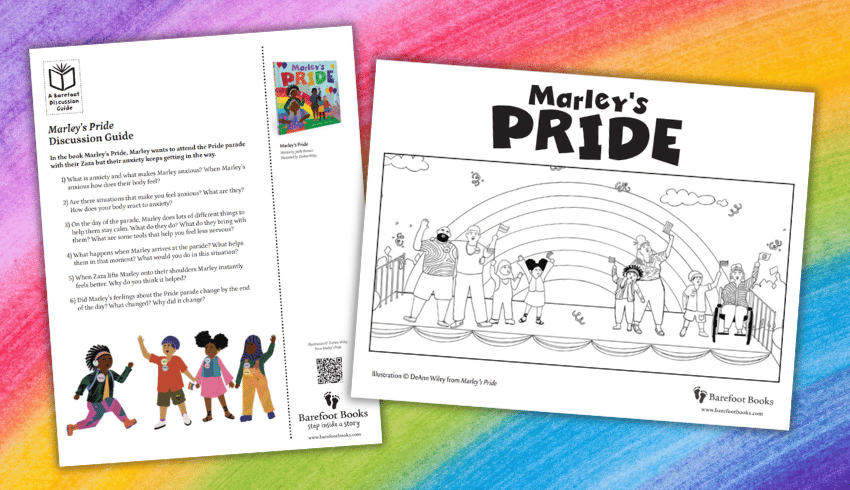
Marley’s Pride is a picturebook about a nonbinary kid with big anxieties. They want to go to the Pride parade for the first time with their beloved grandparent but can they overcome their fears? Explore issues in the book by using this free discussion guide and colouring sheet.
National Literacy Trust resources

The National Literacy Trust has worked with authors Harry Woodgate (Grandad’s Camper) and Benjamin Dean (The Secret Sunshine Project) to develop literacy activities based on their books, mapped to the English curriculum for Key Stage 1 and Key Stage 2.
Gender diversity lesson plan
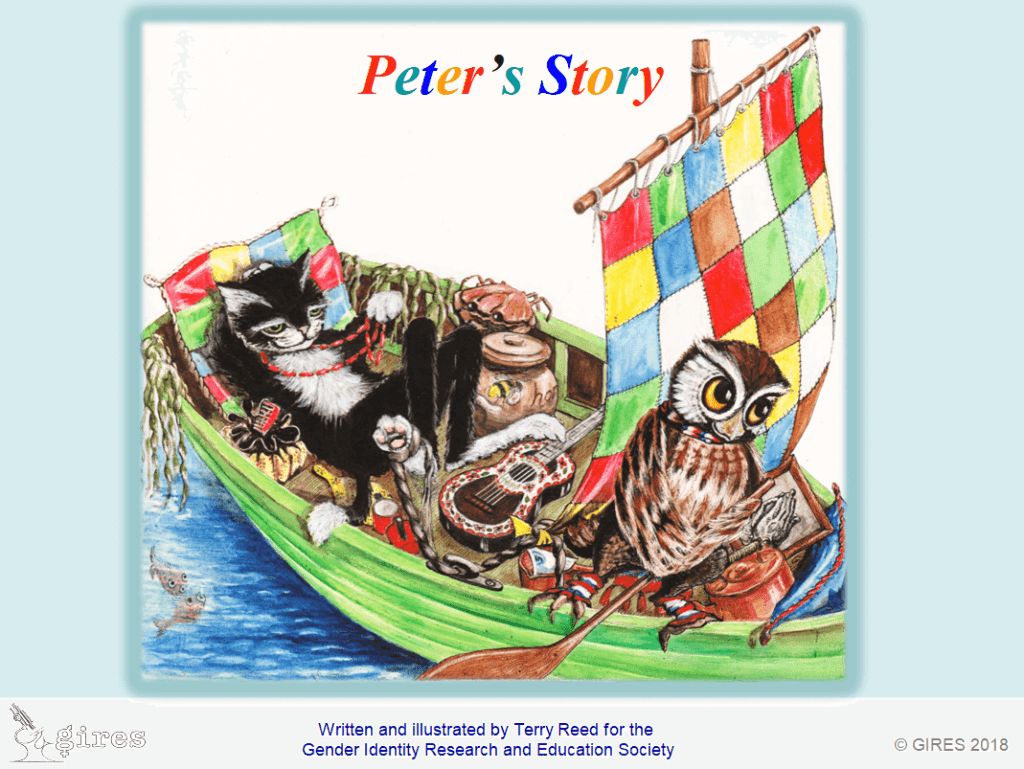
This KS2 lesson plan from GIRES (Gender Identity Research and Education Society) is called Peter’s Story.
The core of the short story is Edward Lear’s famous ‘The Owl and the Pussy-Cat’ poem. The subtext is that the central character has a parent who has transitioned to live as a woman.
It helps young children better understand gender diversity, just as they should understand race, ethnicity and religious beliefs.
Secondary resources for Pride Month 2025
Pride Groups programme
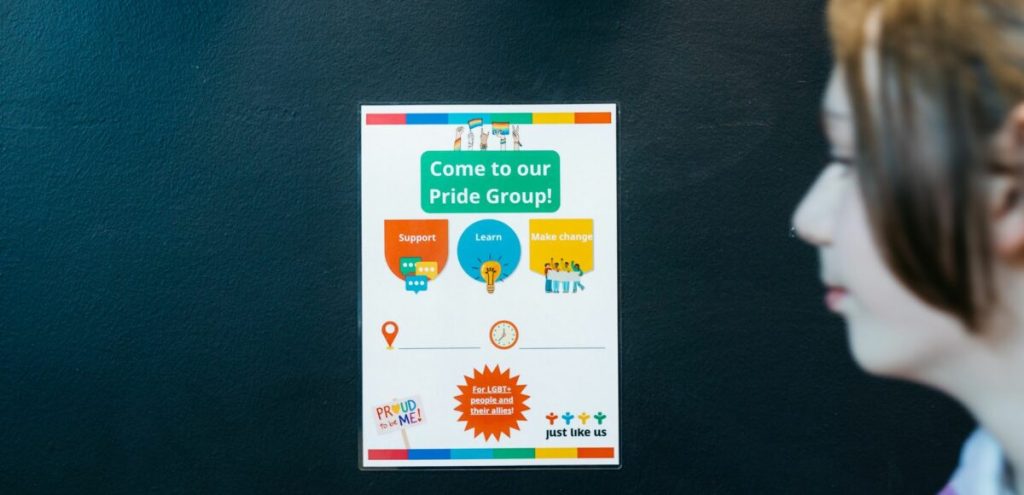
The Pride Groups programme is a national network of lunchtime/after-school clubs that provide safe places for LGBT+ and ally young people to meet, learn and get support. Run your new or existing Pride Group with Just Like Us’ ready-to-go resources.
Section 28 lesson plan and assembly
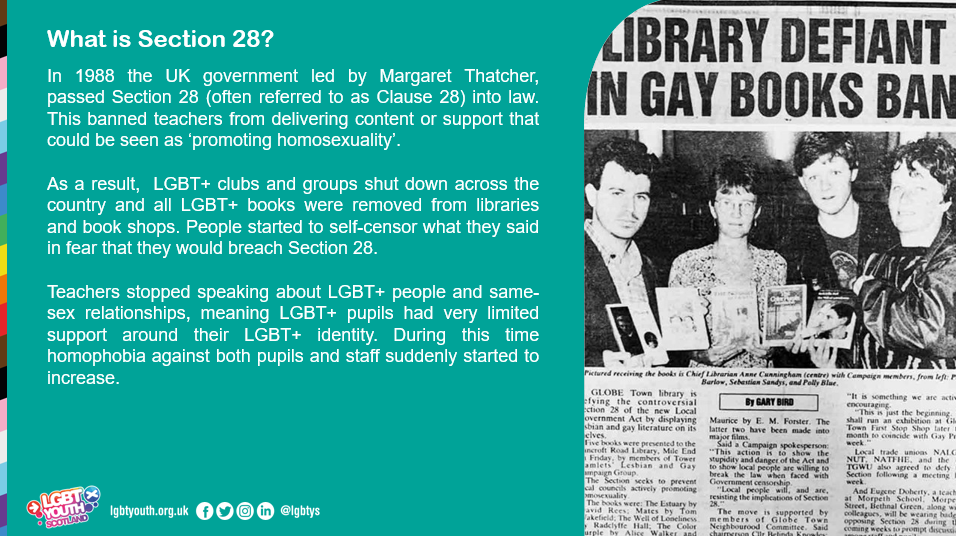
This lesson plan from LGBT Youth Scotland explores the impact of Section 28 on the LGBTQ+ community and its abolishment in 2003. There’s also a 10-minute assembly presentation.
Read inspiring LGBTQ+ books
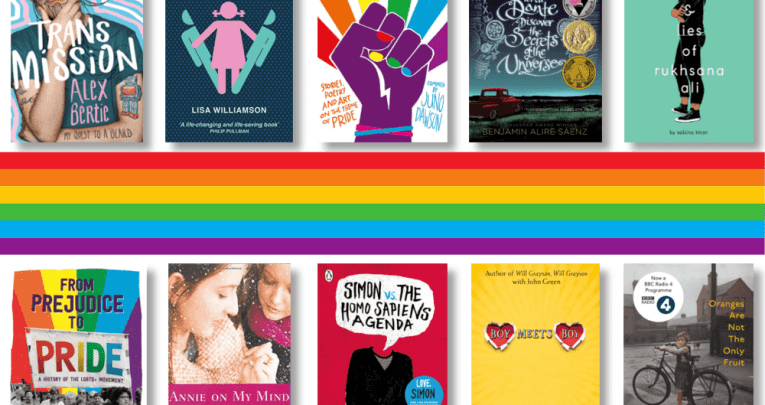
Make sure your library shelves are as inclusive as you’d like your school to be, with these empowering LGBT+ book recommendations.
Create an LGBTQ+ inclusive secondary curriculum
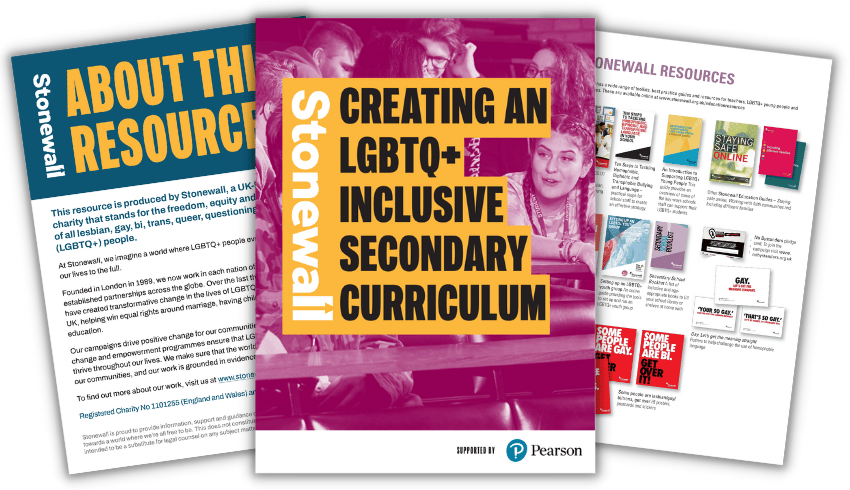
Bring LGBTQ+ inclusion alive and celebrate difference in your school classroom with this inclusive curriculum guide from Stonewall.
Learn how to embed inclusion into every area of your curriculum. This includes everything from choosing inclusive set texts in English to using LGBTQ+ inclusive statistics in maths.
Celebrate LGBTQ+ contributions to media, music and fashion
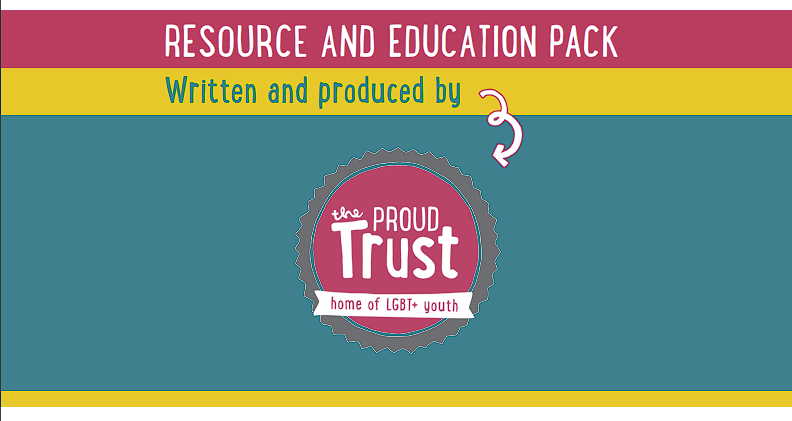
This free resource from the Proud Trust recognises and celebrates the lives and accomplishments of the people who have made a difference in medicine and healthcare. It also highlights the need to consider positively inclusive spaces in healthcare.
Explore LGBT+ themes in film

Into Film developed this assembly for LGBT History Month. It can easily be extended and adapted into a lesson plan for Pride Month 2025 too.
Through the questions, issues and ideas raised in a selection of films, this assembly supports young people to discuss the impact and limitations of the 1967 Sexual Offences Act as the first step on the continuing journey towards equal rights for LGBT people.
There are also links to more Into Film resources for LGBT+ movies like the exceptional Carol and Tangerine.
More Pride Month 2025 resources
LGBT Pride reading pack
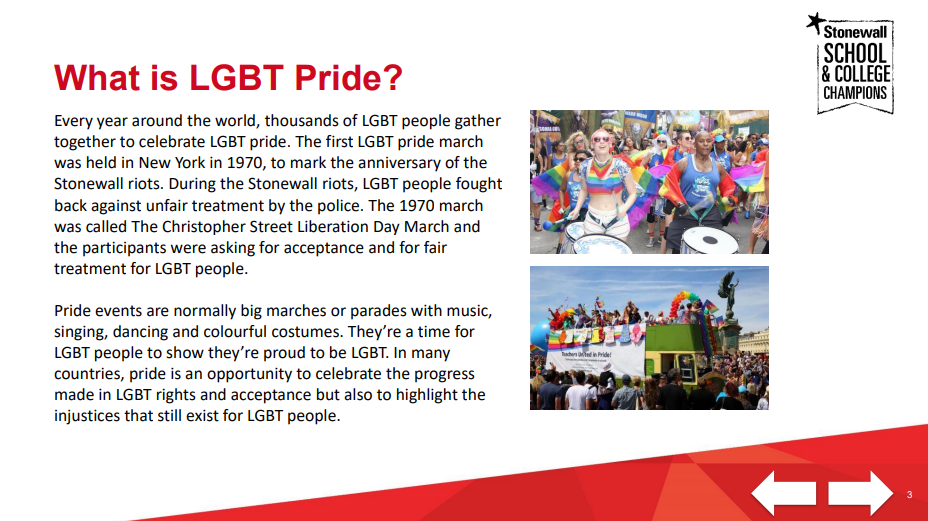
Stonewall has created an LGBT pride e-book for secondary pupils from Stonewall alongside a Pride learning pack which features suggested activities and supporting materials for you to pick and choose from. Get the Pride learning packs here.
LGBTQ+ women and sportspeople
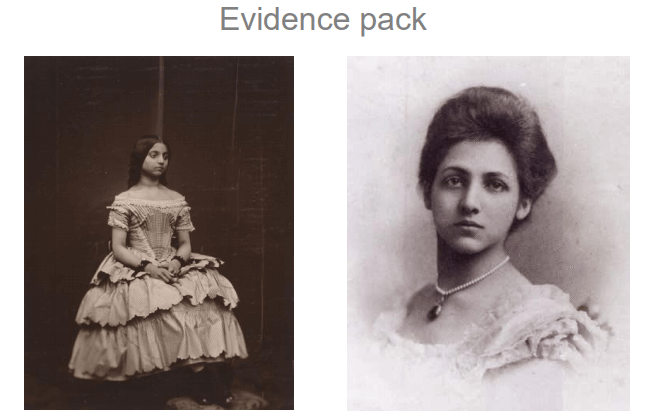
Also from Stonewall, these resources, tailored to KS1, KS2 and secondary, focus on the lives and work of some courageous LGBTQ+ women. You can download them as a lesson pack or as a home learning pack.
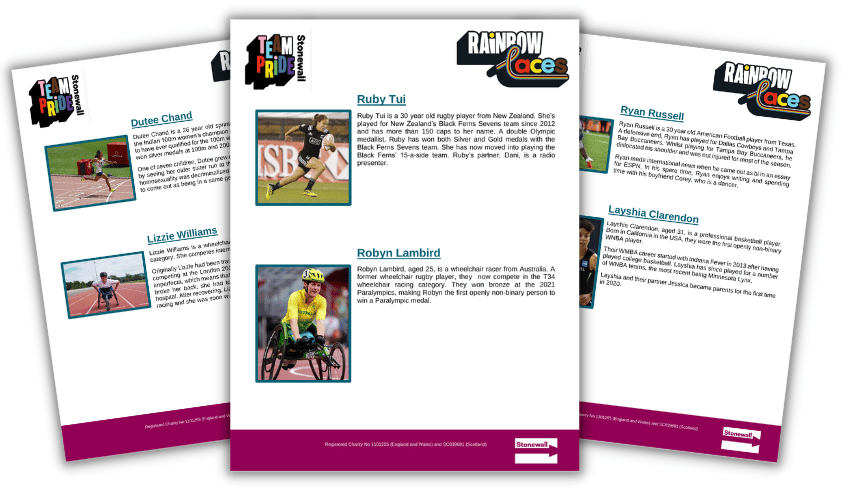
Want to use sports as an entry point during Pride Month 2025? These lesson packs for primary and secondary will help you explore and celebrate LGBTQ+ inclusion in sport.
LGBTQ+ identities
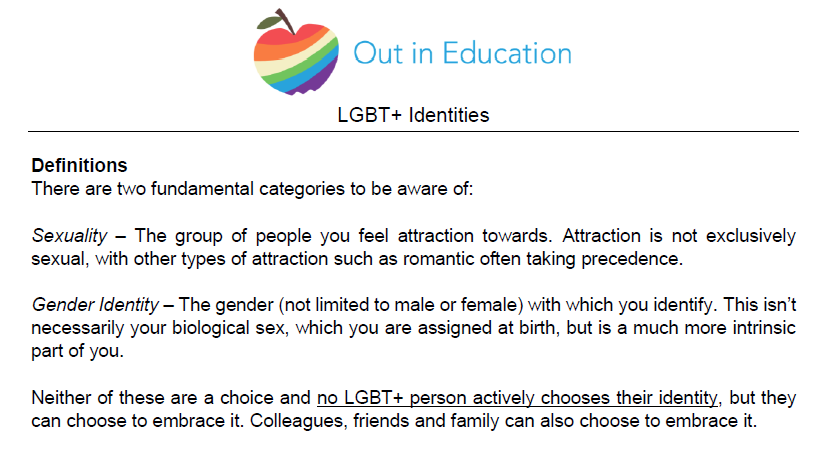
This resource sheet on LGBTQ+ identities from Out in Education provides handy definitions on sexuality and gender. It goes on to explain how these should be seen as useful guidelines or starting points. In reality, identity is more fluid and complex.
It goes on to provide a more accurate model, and talks about ‘coming out’ and the use of pronouns.
Gender explained using continuums
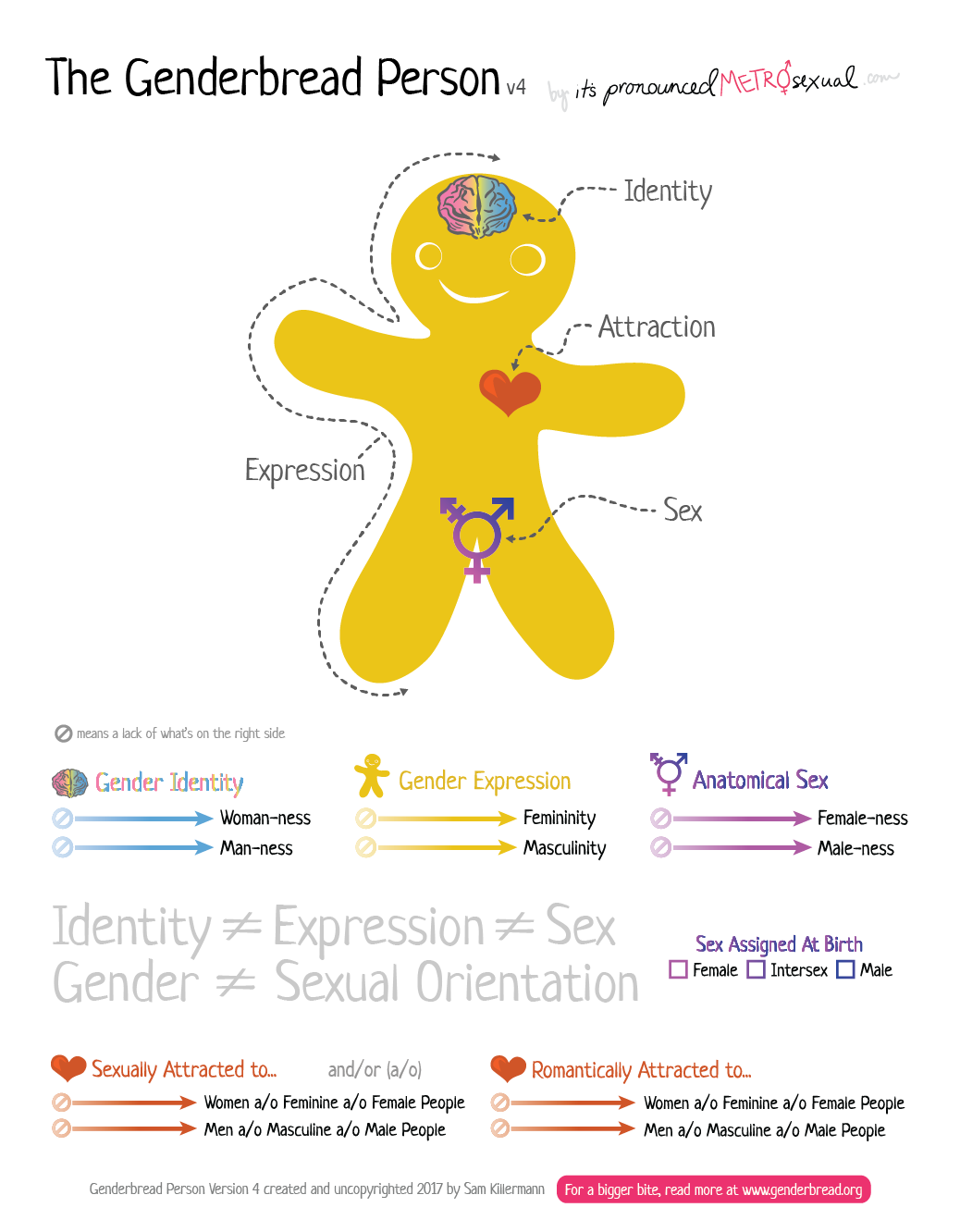
This excellent infographic is part of a post called Breaking through the binary: Gender explained using continuums. You can download it as a PDF.
It’s packed with information on gender and is broken into three categories: identity, expression, and sex. As the post explains, “It’s less ‘this or that’ and more ‘this and that’.”
Supporting transgender kids in school
Use Pride Month 2025 to learn about how best to support trans children in school. The above video from CBBC features Leo, who was born in a girl’s body, giving his top five tips for coping with bullying.
Talking to parents about LGBTQ+ education
Mel Lane (she/her), head of education at education resource provider Pop’n’Olly, explains how to talk openly with parents to build trust around LGBTQ+ inclusion in schools…
In so many cases, a parent or carer with concerns about LGBTQ+ education in school has been misinformed somewhere down the line.
Maybe they’re concerned that their children will be turned gay or trans by hearing a story. Perhaps they’re concerned that children will be labelled by adults and forced to adopt a different gender. Maybe they’re concerned that their Reception-age children are going to hear age-inappropriate things that, in actual fact, aren’t taught until teen years.
Many young parents lived through the Section 28 era themselves and never experienced quality LGBTQ+ education in school at all. This means it’s understandable that sometimes they are afraid, misinformed or confused.
Here are my top three ways to have effective conversations with concerned parents about LGBT+ education:
Inform
Invite parents in to see resources used for teaching across all protected characteristics, including in RE and PSHE. Show them the work you do around encouraging children to be kind and thoughtful and celebrate difference as a good thing.
Listen
Listen to the concerns of parents on an individual basis – what exactly is it they are concerned about?
Educate
Help parents to understand the value of inclusive work for all children. When children see that everyone is welcomed at their school, regardless of their differences, everyone benefits.
Download a free ‘Discussions with parents’ pack for SLT, including all the latest legal info and stats.
Set up your own Pride Group
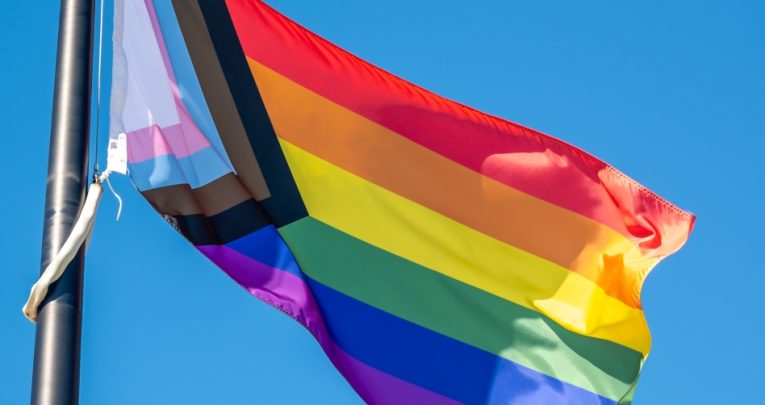
Drama and personal development teacher Alison Ollett makes the case for why every school should have its own Pride Group…
LGBT+ is a hot topic. It’s on our TVs, in our social media feeds, in the headlines. But venture into many school settings, and you’d barely know that LGBT+ students and staff even exist.
That was certainly the case for me and my school of 1,700+ children, but in 2016 everything changed. That was the year in which I took on responsibility for LGBT+ inclusion at my academy.
From the very start, it’s been my intent to embed a whole academy approach. I wanted to ensure all of our students can fully develop their unique characters.
We’ve sought to champion LGBT+ inclusion in the years since. This includes updating academy policies, delivering staff training and developing a robust anti-bullying programme.
We’ve also organised academy-wide awareness events such as a LGBT History Month and School Diversity Week.
Through this work, we’ve been able to make effective changes that have had a positive impact on our students, while also developing a culture of acceptance – one in which diversity isn’t just acknowledged, but rightfully celebrated.
Setting up our Pride Group
It was at the height of the pandemic, when we were predominantly teaching remotely, that I started realising just how important the work we’d been doing really was.
A group of LGBT+ students reached out and requested that we develop an online Pride Group. They were missing the sense of community and support they’d had pre-lockdown.
I sent an email invitation out to all students, and thus Plume Pride was born. It’s our very own student-led LGBT+ and ally group and has since grown to over 60 student members.
The group currently holds weekly in-person meetings, arranges special one-off evening sessions and has an online team who are always available to students for assistance and sharing topical news.
Our Pride Group offers a safe space for students that enables them to meet with peers and seek support from staff.
Since the regular meetings began, many of our trans students have been able to start their social transition. Many of our LGBT+ students have received support when coming out to friends and family, navigating potentially challenging conversations and building crucial relationships with their parents and carers.
The group also provides family support, through which our staff can sit as student advocates in parent/carer meetings, in cases where conversations surrounding young people’s gender identity or sexual orientation can prove somewhat difficult and challenging.
Representation matters
One of the main lessons I’ve learnt from our Pride Group is how much representation matters. According to research by Just Like Us, pupils attending schools with strong positive messaging about being LGBTQ+ exhibit drastically better levels of wellbeing compared to other settings and feel safer. This is regardless of whether they happen to be LGBTQ+ or not.
Our Pride Group regularly meets at Friday lunchtime. Admittedly, there have been occasions when I’ve watched my colleagues make their way to the staff room and felt tempted to join them. But then the corridor outside my classroom becomes filled with giggles and chatter before a steady stream of students enters, all smiling and full of energy.
I return to my seat and watch as the room fills with students from each year group. Salutations and compliments criss-cross the room as they take their places in front of me.
As I sit and watch these amazing young people socialise, support each other and continue to change their academy for the better, I’m reminded of how thankful I am for the role I have as their facilitator.
Alison Ollett (pronouns: she/her) is a drama and personal development teacher. She’s also whole academy mental health champion at Plume, Maldon’s Community Academy in Essex. For more information on setting up a Pride Group, visit justlikeus.org or follow @JustLikeUsUK.
Bring LGBTQ+ role models into the classroom
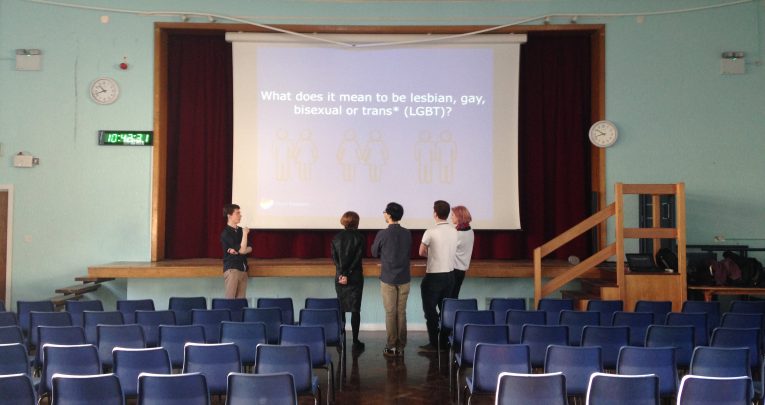
Andrew Coe, former project leader for Out in Education, explains how a visit from an LGBTQ+ role model can help you to create a safe and inclusive classroom…
When “coming out” to a room of around 200 pupils, it is perfectly normal to experience some degree of apprehension.
Many of us who identify as LGBT+ did not get to bring our full selves to school. We spent years in the closet, attempting to blend in with the straight and/or cisgender majority of our peers.
For this reason, venturing back into this environment to educate today’s pupils about our identities can feel daunting. But the rewards are limitless.
This is the motivation behind student-led volunteering project Out in Education, based at the University of Nottingham.
Assemblies and lessons
Since 2013, they have visited 50+ schools to deliver assemblies and lessons on LGBT+ topics. This includes personal coming out stories, inclusive sex education, and anti-bullying workshops.
I had the pleasure of working with the project whilst studying physics at Nottingham, seeing the positive impact first-hand.
“The rewards are limitless”
One memorable example took place following a Year 8 assembly on different identities at a Nottingham secondary school. Soon after we had finished, one pupil came to the front to talk with us. They came out as bisexual for the first time.
To see such immediate effects, and to have given this pupil the confidence to come out so early in life – something which I was not able to do – was the greatest victory.
Anonymous Q&A
A regular feature of an Out in Education workshop is the ‘Anonymous Q&A’. This is where pupils write down questions which are answered by the volunteers at the end of the lesson.
This creates a far more organic learning process. Instead of relying on hypothetical situations, pupils hear about the personal experiences of others who have recently been through the school system themselves.
Unfailingly, pupils of all ages ask intelligent and thoughtful questions:
- How do you know when your real self shows?
- Do you prefer to be called gay/lesbian or normal?
- Did all of your friends accept you [when coming out]?
This creates conversations that are rewarding for both the pupils and volunteers.
Perhaps surprisingly, abrasive or inappropriate questions are rare. But they are usually along the lines of, “How do lesbians have sex?” or, “Can I have your number?”.
The tactic isn’t to ignore these. Instead, we either explain why they aren’t appropriate or, particularly for the former, to produce a sincere, matter-of-fact answer that is age appropriate.
Bullying
It is never too early to introduce pupils to the concepts of gender and sexuality. If they haven’t already, every pupil will go on to encounter LGBT+ people in their lives. The concepts of love and living as your true self are approachable at any age.
Current standards are still failing a tremendous number of LGBT+ children across the country. According to the Stonewall School Report (2017), 45% of LGBT pupils in Britain’s schools are bullied for being LGBT, and two in five young transgender people have attempted suicide.
A mere 13% of LGBT pupils have learned about healthy relationships in a same-sex context, and three in five have never been explicitly taught that same-sex couples can get married.
For full-time educators, the pressures of teaching core subjects can be heavy enough without the additional responsibility of being fully inclusive.
How you can help pupils
The solution isn’t to reinvent the syllabus, but to instead make subtle changes to the language and presumptions that can exist in the classroom.
For example, it cannot be assumed that every pupil in the room will be straight and cisgender, and using gender-neutral language (eg ‘partner’ instead of ‘boyfriend’) can prevent feelings of alienation.
Also, never allow the word “gay” to be used in a derogatory context. Display a pride flag in your classroom to remind LGBT+ pupils that they are safe. Where lessons permit, include LGBT+ figureheads or themes, which are currently seldom seen outside of PSHE lessons.
Until LGBT+ inclusive education becomes a compulsory part of the curriculum, projects like Out in Education will continue to help create safe and inclusive classrooms.
The phrase, “Be who you needed when you were younger” runs through the core of the project, with the hope that future generations won’t have to suffer as they explore their identity, but instead be able to celebrate them safely and confidently.
Andrew Coe is former project leader for Out in Education.










